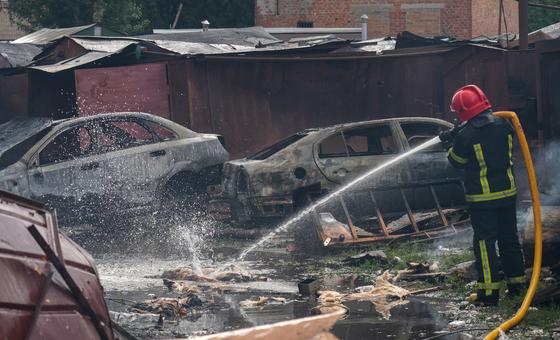The UN’s top political affairs official on Tuesday reiterated that attacks on civilians and civilian infrastructure are prohibited by international law. More than 170 civilians lost their lives and a further 690 were injured in continued Russian strikes across Ukraine last month.
That’s the highest number of civilian casualties in a single month since June 2023, Rosemary DiCarlo, UN Under-Secretary-General for Political and Peacebuilding Affairs told the Security Council.
Over half of the casualties occurred in Kharkiv during a new Russian offensive, with numerous attacks in other locations killing civilians and causing widespread destruction.
“The escalation of attacks impacting Ukrainian civilians is unconscionable,” Ms. DiCarlo said.
“Since February 2022, OHCHR has recorded 11,126 civilians killed, and 21,863 civilians injured. The actual figures are likely significantly higher,” she added.
Russian casualties
In the same period, Russian authorities have reported that at least 91 civilians have been killed and 455 injured in Russia, primarily in the Belgorod, Briansk, and Kursk regions bordering Ukraine.
“We once again stress that attacks on civilians and civilian infrastructure are prohibited by international law…they must stop immediately,” she stressed.
Massive damage to infrastructure
Ms. DiCarlo further informed Council members of massive damage to civilian infrastructure, particularly its energy and critical nuclear power infrastructure.
A joint needs assessment conducted by Ukraine, UN, World Bank and European Commission – prior to the latest escalation – estimated that as of December 2023, reconstruction and recovery in Ukraine would cost some $486 billion dollars over the next decade.
“But the worst consequences of the attacks against energy infrastructure are yet to be felt. That is because the shelling and airstrikes are also making it difficult to complete the repair of damaged facilities before next winter,” she warned.
Humanitarian crisis
Under-Secretary-General DiCarlo also highlighted the dire humanitarian crisis in Ukraine, as well as disruptions to the food supply worldwide resulting from damage to shipping and disruptions in navigation through the Black Sea.
In 2023 nearly 282 million people in 59 countries faced high levels of acute food insecurity, an increase 24 million people since the previous year, she said.
Within Ukraine, together with its partners, the UN reached more than 4.4 million people with humanitarian assistance, however, aid efforts are constrained by lack of sufficient funds.
The 2024 Humanitarian Needs and Response Plan is currently 27 per cent funded, Ms. DiCarlo said, urging donors to sustain their generous financial support.
“This will allow us to continue to deliver life-saving assistance to the vulnerable population.”

